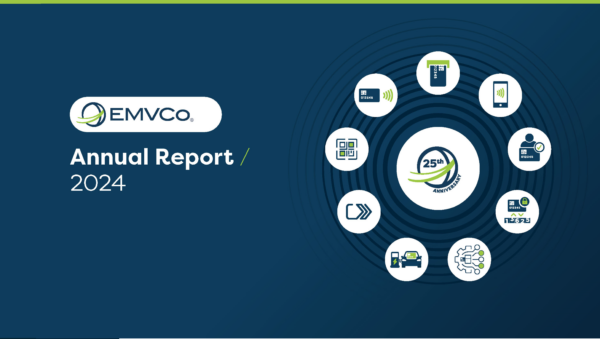In this EMV® Insights post, Oliver Manahan, EMVCo Director of Engagement and Operations, summarises the key discussions from the Athens Board of Advisors Meeting.
What does the future hold for card-based payments?
This is the question that our Board of Advisors meetings set out to answer. We do this by bringing together leading payment stakeholders from across the world to explore the trends and technologies impacting the payments industry.
With Associates gathering in Athens, Greece, this month for the first EMVCo meeting of the year, discussions centred on how new developments in payment initiation and authentication, an evolving regulatory landscape in Europe, and shifts in global mobility are shaping the strategic direction of EMVCo and EMV Specifications in 2025 and beyond.
Here are the main takeaways:
Exploring the use of passkeys in EMV Secure Remote Commerce (SRC)
A passkey is a FIDO authentication credential based on FIDO standards that allows a user to sign in to apps and websites with the same process that they use to unlock their device (such as a biometric, a PIN or a pattern). FIDO Alliance reported that passkey adoption doubled in 2024, with consumer awareness also increasing to 57%[1].
By removing the reliance on traditional passwords, growing momentum for passkeys presents significant opportunities to promote simpler and more secure checkout experiences.
EMVCo has already published a white paper with the FIDO Alliance to explain how the use of FIDO authentication data in EMV 3-D Secure (3DS) messages – including passkeys – can streamline e-commerce checkout while reducing friction.
Now, EMVCo is exploring how the EMV SRC ecosystem can use passkeys to simplify the customer journey, with discussion and engagement currently centred on identifying the key technical and user experience considerations.
Meeting emerging authentication needs with EMV 3DS
Supporting industry stakeholders to optimise the development of EMV 3DS solutions to address new technologies, regulatory requirements and consumer behaviours is an ongoing priority for EMVCo.
In 2024, EMVCo published an interactive white paper outlining how EMV 3DS solutions can better support key use-cases including frictionless authentication, out-of-band authentication, and recurring and instalment transactions. Work is now progressing to expand the resource to include support for Secure Payment Confirmation (SPC) and WebAuthn, as well as the deployment of Message Extensions and the Split-SDK. The development of interactive resources is part of a wider programme to enhance and simplify the EMV 3DS Specifications and supporting documentation, making them easier for stakeholders to access and consume.
Attendees also heard how EMVCo is investigating how EMV 3DS can work with the new European Digital Identity (EUDI) Wallet framework. This includes collaborating with the EU Digital Wallet Consortium (EWC) to examine the potential impacts of the EUDI Wallet regulation on EMV 3DS and to assess how the EUDI Wallet can facilitate cardholder authentication in EMV 3DS transactions. A white paper is also being developed to further support industry understanding, which will be updated as large-scale pilots and member-state implementations move forward.
Navigating an evolving regulatory landscape in Europe
The EUDI Wallet initiative reflects a broader, robust regulatory agenda that is influencing the development of the payments ecosystem in Europe.
For example, the European Union’s Cyber Resilience Act (CRA) has been introduced to safeguard consumers and businesses by enhancing cybersecurity standards for all products with digital elements. Eric Vetillard, Lead Certification Expert at the European Union Agency for Cybersecurity (ENISA), joined attendees to explain the role of ‘conformity assessments’ in demonstrating compliance with the CRA’s various requirements.
Elsewhere, Dr Valia Babis, Advisor to the Governor at the Bank of Greece, examined the potential impact that initiatives such as the digital euro and the Instant Payment Regulation (IPR) could have on payments acceptance across the region.
Amid regulatory developments in Europe and other jurisdictions, EMVCo continues to engage closely with its Board of Advisors to monitor and analyse the impacts. This will help ensure the EMV Specifications and related testing processes continue to support marketplace requirements.
EMVCo is also working with various industry partners worldwide to promote secure and convenient payment experiences across various use-cases. This includes the OpenWallet Foundation (OWF), whose Executive Director, Daniel Goldscheider, joined attendees to discuss the crucial role of cross-industry collaboration in enabling the development of a mobile wallet ecosystem that enables user choice, privacy and security.
Towards a new era of mobility payments
Global mobility is changing. Sales of electric vehicles (EVs) increased by 25% in 2024[2] and EVs are projected to account for 65% of all light vehicle sales across the automotive market by 2035[3]. In parallel, the number of public transport users has recovered to pre-pandemic levels and is anticipated to reach 5.2 billion users by 2029[4].
To support this evolving landscape, EMVCo is continuing to explore the development of an EMV Electric Vehicle Open Payment (EVOP) Specification that would enable a card-based capability within the ISO 15118 ‘Plug & Charge’ experience. Following extensive engagement over the past 18 months, continued collaboration will be a priority as work progresses.
Transit is also a key use-case for Payment Account Reference (PAR) data, which is a way to link transactions that use EMV Payment Tokens with the Primary Account Number (PAN) for which the Payment Tokens have been issued. PAR data can be used as a linkage mechanism by transit operators to manage various situations that could arise as a result of allowing open loop payments, such as calculating the correct fare in a pay as you go scenario. Following industry feedback, attendees discussed the use of PAR for transit and explored potential enhancements to support increased adoption and usability across other use-cases – with a dedicated Special Interest Meeting (SIM) planned for the coming months.
Contribute to the development of EMV Specifications
The upcoming EMVCo Technical Meeting in Bangkok, Thailand (8-10 April) provides EMVCo Associates with the opportunity to delve deeper into the technical considerations driving EMV Specification development.
[1] FIDO Alliance, Passkey Adoption Doubles in 2024: More than 15 Billion Online Accounts Can Leverage Passkeys for Faster, Safer Sign-ins, December 2024
[2] Reuters, Global electric vehicle sales up 25% in record 2024, January 2025
[3] McKinsey, Full throttle, May 2023
[4] Statista, Worldwide number of public transport users from 2017 to 2023 with a forecast through 2029, November 2024



